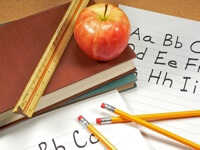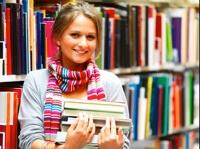Education, Types of school in Slovakia
Typ práce: Ostatné
Jazyk:
Počet zobrazení: 1 752
Uložení: 143
Education
- a) školský systém (typy školských zariadení, organizácia školského roka, klasifikácia,prázdniny)
- b) vyučovanie (rozvrh hodín, predmety, prestávky, školské stravovanie, aktivity na hodine)
- c) život žiaka (voľný čas, záľuby, mimoškolské aktivity, brigády, priatelia, vreckové)
Education is very important in people´s lives. It gives us a knowledge of the world around us. It develops in us a perspective of looking at life. It helps us build opinions. So, it´s not just about textbooks. It´s about the lessons of life.
The education system in Slovakia:
In Slovakia we have: state schools (you don´t have to pay for it), private schools (you must to pay fees) and church schools (?)
Types of school in Slovakia:
In Slovakia there are lot of types of schools.
- All education starts in kindergarten, it´s called pre-schooleducation, where goes childer from 2-5 years. They learn about colors, flowers, animals, they play together with toys, they must eat and sleep. That´s the best for children, because they need to be in contact with another children. This is also the best alternative for parents, which need to go work and they have noboty to take care for their chldren.
- Next part of education is primary school. Children start studying there at the age of 6. It´s divided into two parts-1st and 2nd. Firs grade is from 1st class to 4th class and 2nd grade is from 5th class to 9th class.
In the 9th class they can choose what they want to be in there lives and they go study at Secondary school.
• Secondary school is a 4-year school, which prepares students for study on university. The study finishes with a leaving examination. In Slovakia there are many types of secondary schools. Students can choose between gymnasium, or vocational and technical schools (nursing, electro-technical, bussines/hotel academies).
- gymnasium - offers general theoretical education and prepares students for higher education
- vocational/technical schools prepare children for future professions, students there have theoretical and practical subjects, but today students from these schools goes to universities too.
Then after secondary school is higher education. It lasts from 3 to 6 years. Students can study here everything from law, medicine, economics, journalist and pharmacy to agriculture, engineering, drama and fine art.They get their university diplom when they ends this univerzity after their state examination.
Organization of the school year and holidays:The school year starts in September and ends in June. During the school year we must learn and for it we get some marks. We write exams or test, and sometimes we must response from new curriculum. In the end of the year and also in half of year we get our report card marks.
In July we have a big summer holidays but we have some holidays during the school year, too. We have spring holidays, autumn holidays, winter holidays, easter holidays and there are a couple of free days during public holidays (for example 1st May, 8th May, ...).
Timetable and subjects:
Schools usually begin at 8 o´clock and ends for every student differently. A lesson usually lasts 45 minutes. Every student has his own timetable.
-In first grade usually children have daily around 4-5 hours, it´s not so much, they learn only the most important things - write,read,draw,sing. Children don´t get a lot of homeworks and they need a help of parents.
-In second grade and in secondary schools students get more hours from 6 to 8. Their timteble is full. They get more subjects for example Slovak language, math, english, german language, biology, history,chemistry, geography, psychology, philosophy, etc.
Breaks and lunch in school:
Between every hour is a little break, usually 5 or 10 minutes long. Students can go to the toilet or eat something small (for example fruit). About 10 o’clock there is first bigger break when they can eat their snack and about 1 o’clock is second bigger break when they can have a rest or they can go to a lunch in the school. Many students don´t go to lunch in the school canteen because they bring more food from home. Activities on lesson:
-Every student should be prepared for the lesson but sometimes happens that he´s (she´s) not ready . He forgotten or he was ill. In these situations he must apologize to the teacher. When he forgotten learn he can get 5, but when he was ill last week, he may be forgiven to him. But some kind teachers forgiven him also when he just forgotten. Students like these teachers.
- Students can get an extra acitivities on lesson. Theachers can give them extra projects or reviews to expand their knowledges.
Free time, hobbies, extra school acitivities and friends:
Extra school activities are activities which children do after school. In some towns or villages they don´t have a place for extra activities, but in bigger towns they have so children goes there and do their favourite sports, or play on the music instruments. These activities do children from primary school. That´s their hobby, the way like they spend their free time. Students at secondary schools have less free time because they have to be more prepared for school.They spend their free time mostly on computer or TV. Some of them go out with friends or on the brigade.
Pocket money and brigade:
Students are not independent. They need to get a pocket money from their parents. Some receive more, some less and there is also some students who don´t receive a pocket money. Sometimes spendings are so high and parents don´t want to give them Money, so they need to find a part time job (brigade). They try to work at weekends or when they have holidays. Typical jobs are in restaurants, in the kitchen, in fabric or they´re delivering newspapers. Every student need a money for example because he want to buy some new clothes or some food when he goes out with friends.
British, american schools and my favourite subject.
| Podobné práce | Typ práce | Rozsah | |
|---|---|---|---|
|
|
Education (konverzačná téma) | Ostatné | 2 370 slov |
|
|
Education – Sloh po anglicky vzdelanie | Referát | 1 119 slov |
|
|
Education | Ostatné | 2 418 slov |
|
|
Education essay | Maturita | 757 slov |
|
|
Education – UK, USA (Anglický jazyk) | Maturita | 852 slov |
|
|
Education (Anglický jazyk) | Maturita | 611 slov |
|
|
The System of education in GB and CZ – maturitná otázka | Maturita | 1 829 slov |
|
|
Education topics to talk about | Maturita | 2 886 slov |
|
|
Education (slovné spojenia a frázy) | Maturita | 613 slov |
|
|
Education in Slovakia | Ostatné | 521 slov |
|
|
Education – Vypracované zadanie na VIDEO | Maturita | 9 slov |
|
|
Education (topic, essay, vocabulary) | Ostatné | 630 slov |
|
|
Education téma | Maturita | 832 slov |
|
|
Education | Učebné poznámky | 507 slov |
|
|
Education in Slovakia, Great Britain, and the USA – osnova na prezentáciu | Ostatné | 269 slov |
Maturita z anglického jazyka
| Ďalšie práce z rovnakej sady | Rozsah | |
|---|---|---|
|
|
Food | 710 slov |
|
|
Communication and Languages | 503 slov |
|
|
Culture and art | 441 slov |
|
|
Health and care | 669 slov |
|
|
Education, Types of school in Slovakia | 991 slov |
|
|
Housing | 910 slov |
|
|
Idols and Celebrities | 1 006 slov |
|
|
Jobs | 968 slov |
|
|
People and Nature | 975 slov |
|
|
People and society | 718 slov |
|
|
Human relationship | 629 slov |
|
|
Science and Technology | 732 slov |
|
|
Shopping and services, Types of shops | 606 slov |
|
|
Sports and Games | 590 slov |
|
|
The young and their world | 809 slov |
|
|
Towns and Places | 500 slov |
|
|
Travelling, Getting ready for a journey | 1 575 slov |
















